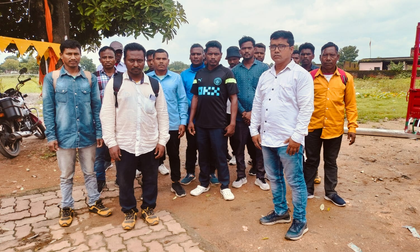17 workers from Jharkhand trapped in Cameroon return home after MEA intervention
By IANS | Updated: August 25, 2025 16:30 IST2025-08-25T16:24:49+5:302025-08-25T16:30:26+5:30
Ranchi, Aug 25 Seventeen migrant workers from Jharkhand, who had been stranded in Africa's Cameroon for the past ...

17 workers from Jharkhand trapped in Cameroon return home after MEA intervention
Ranchi, Aug 25 Seventeen migrant workers from Jharkhand, who had been stranded in Africa's Cameroon for the past several months, returned home safely on Monday following the intervention of the Ministry of External Affairs (MEA).
The workers, belonging to Bokaro and Hazaribagh districts, were among 19 people who had travelled to the West African nation through a private agency to work with Transrail Lighting Limited, a company engaged in electricity transmission projects.
However, after reaching Cameroon, they alleged that the company withheld their wages for four months, pushing them into severe financial distress. With no money to buy food or other essentials, their condition deteriorated.
In a desperate plea, the workers had recorded a video message and circulated it on social media, appealing to both the Central and the Jharkhand governments for help.
The Jharkhand Labour Department took cognisance of the matter and formally alerted the MEA, requesting urgent intervention.
Acting swiftly, the MEA, in coordination with the Indian Embassy in Cameroon, not only facilitated their safe return but also ensured that the company released their pending wages.
Officials confirmed that while 17 workers landed in India on Monday and reached their respective homes, the remaining two -- Phoolchand Murmu from Hazaribagh and Bablu Soren from Bokaro -- are scheduled to return on Tuesday.
This is not an isolated case. Experts point out that several workers from Jharkhand and other states are often lured abroad with the promise of higher wages and better opportunities, only to end up in exploitative situations.
Their rescue and repatriation typically require lengthy negotiations through diplomatic channels.
The safe return of these workers has brought relief to their families and highlights the need for stricter monitoring of recruitment agencies as well as better awareness campaigns to prevent such exploitation in the future.
Disclaimer: This post has been auto-published from an agency feed without any modifications to the text and has not been reviewed by an editor
Open in app